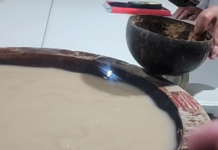Siosifa Vailima Tuita, 52, has been sentenced to 12 years in prison for the manslaughter of his twin sister.
Tuita appeared before Lord Chief Justice Whitten in the Supreme Court.

The sentence has been backdated to March 7, 2022 when the Defendant was remanded in custody.
The final two years of the sentence have been suspended for a period of two years from the date of the Defendant’s release from prison on condition that the prisoner comply with certain directions of the court.
On the morning of Saturday, 5 March 2022, ‘Alilia Lolohea was at her residence in Falaleu, Vava’u. She lived next door to Tuita and his twin sister, ‘Alisi Tuita. At around 7.35 am ‘Alilia heard a loud cry coming from the Tuita residence. When she got up and opened the door of her residence, ‘Alilia saw Iosifa, who was shirtless, running away from his housee. ‘Alilia then walked to the fence of her property where she saw ‘Alisi lying on her verandah floor.
She and a neighbour summoned the Town Officer, Simoneti Toko, and asked for his help. Simoneti found ‘Alisi lying face down close to the door to the living room, in a pool of blood and with a knife lodged in her head.
By this time, Iosifa Tuita had gone to the Neiafu Police Station where he spoke with Sergeant Fe’aomoeata. As a result, police attended the residence where they found ‘Alisi’s body and rushed her to hospital.
Dr Mosese Taumoepeau examined the body and found that ‘Alisi died at 7.50 am, from a total of nine stab wounds to her chest causing aortic rupture, armpit, back, abdomen and her head where the knife was about five centimetres into her skull.
On October 17, 2022, Tuita appeared before Judge Cooper who noted that the accused had a history of mental health problems and that in those circumstances, it was imperative to understand whether the Defendant was fit to enter a plea.
Tuita made a statement in which he said he said he did not remember doing anything with a knife; that there was a struggle on the front verandah of their house; that his sister fell down and became injured; but did not know how she got her injuries.
Judge Cooper gave directions for a psychiatric assessment by Dr Mapa Puloka as to whether the Defendant was legally insane, as defined by s 17, at the time of the offending.
Dr Puloka reported that the defendant had a long history of alcohol and drug abuse. He began experiencing hallucinations in 2015 and his continued substance abuse led to psychosis, paranoia, and other bizarre behaviours.
He had been admitted to the Vaiola psychiatric unit on a number of occasions.
Tuita told Dr Puloka that on the day in question he arose early and was doing some domestic chores when his sister scolded him for making noise and for his past drunkenness. She threatened to report him to the police and said he would be sent back to the psychiatric unit in Tongatapu.
This made him angry and he picked up a knife and attacked his sister, chasing her as she ran towards the door. He only remembered inflicting two of the nine stab wounds reported by Dr Taumoepeau;
He ran to the police station and told officers that his sister was hurt and that he had stabbed her.
He said he did not intend to kill his sister, only hurt her.
Dr Puloka gave as his opinion that Tuita was suffering from a mental and behavioural disorder due to use of drugs and other psychoactive substances. He said it was unlikely that he was insane during the commission of the offence;
However, his alcohol addiction and chronic brain disorder substantially impaired his mental responsibility for his acts in the killing. His drug related psychiatric or mental disorder and recurrent depressive moods were within the meaning of diminished responsibility during the time of the commission of the offence. Tuita was fit to stand trial.
Tuita later said he would plead guilty to the charge of manslaughter.
In response Lord Chief Justice Whitten said that in his opinion, a defence of diminished responsibility was not actually available under Tongan law and suggested that Parliament consider changing the Criminal Offences Act to include a partial defence of diminished responsibility.
However, the court was advised that following instructions from the Attorney-General, the Crown maintained its acceptance of a guilty plea to the manslaughter charge, principally because, on the evidence, there would be “difficulty in proving the mental element for reckless murder”, and as such, there was “little to no reasonable prospect” of obtaining a conviction for murder.
In sentencing Tuita, Lord Chief Justice Whitten said he would reduce some of the sentence because of the defendant’s mental disorder. However, he said it was not clear what, if any, part the addiction related disorder played in the offending.
“It is even less clear as to whether it would have occurred at all had the Defendant not been so afflicted,” the judge said.
“The Defendant is to be allowed a discount for his guilty plea to manslaughter. I also take into account that but for Cooper J’s astute intervention, the Defendant was prepared to plead, without legal advice or representation, guilty to murder.
“In that regard, I commend this case to Government as yet another example of the potential for travesties of justice resulting from a lack of a full legal aid service, particularly for serious criminal prosecutions”







